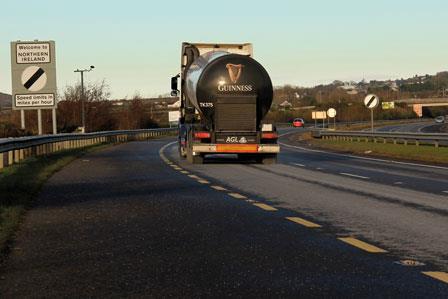
While prime minister Boris Johnson dismisses custom delays between Britain and Ireland as “teething problems”, hauliers are telling a very different story.
At a recent session of the Northern Ireland Infrastructure Committee, operators spelt out the reality of the new trading rules in stark detail. Ballymena haulier McBurney Transport employs 800 staff and operates 350 trucks and 1,100 trailers. The company ships approximately 114,000 trailers across the Irish Sea every year.
Director Paul Jackson told the committee his firm had incurred between £67,000 and £73,000 of additional costs in the first week of January alone, with movements down 24% compared with the previous fortnight. “We’ve shipped 63 empty trailers back in – and we’re going to have to ship more empty trailers in this week – we can’t afford to ship any more empty trailers into Northern Ireland; it’s extremely urgent that we plug this,” he says.
Complex regulations
Northern Ireland hauliers say much of the problem lies with British shippers that were not prepared for the complexity of new customs regulations. As a result, many hauliers’ customers have suspended deliveries while they scramble to figure out what the new regulations require, with others pulling out of the Irish market altogether.
Paul Abbott, group director of Knights of Old, estimates approximately 40% of the firm’s customers were not prepared for the Brexit transition despite the firm’s attempts to prepare clients. He tells MT: “Some of the bigger players have got their act together and their clearances sorted out for Northern Ireland and the Republic. However, some of the smaller businesses have found it difficult as they’ve not got the infrastructure in place or done much homework, which can put the onus on freight carriers.”
Which group?
Sending groupage is particularly difficult under the new system, especially for products such as meat, milk and fish, which now need to be certified by vets when moving from Britain to Northern Ireland and the Republic. This certification has yet to be introduced for supermarkets in Northern Ireland, but already applies in full for food service and catering firms.
When the certificates are issued, the lorry trailer has to be sealed. However, groupage involves pick-ups from multiple warehouses and loads sometimes moved from one lorry to another en route. This means trailer seals need to be broken, goods recertified and seals reapplied multiple times, creating a complex and time-consuming process. As a result, firms are suspending certain groupage deliveries or avoiding certain products.

Palletforce spent months preparing members and customers for the end of the Brexit transition. After initial teething problems in the first week, its trade with Northern Ireland has resumed to near normal levels – except for groupage, says commercial and international director David Breeze, pictured.
“The system’s not designed for groupage. So we’re restricting our product set now,” he says. “We’re not carrying certain commodities that would require vet or plant inspector checks to avoid the problem of sitting and waiting to be inspected and have paperwork checked at Northern Ireland checkpoints and we will review that.”
UK trade officials have successfully tested a simpler groupage system on the Liverpool to Belfast route. This involves certifying and sealing pallets of shrink-wrapped goods rather than sealing the trailer.
However, RHA CEO Richard Burnett says: “The new model has not been stress-tested and does not consider the impact on suppliers having to develop bespoke processes within their own businesses.
“It also fails to address the complexity and overly bureaucratic requirements designed for external trade and not internal within the UK. It does not recognise the shortage of vets.”
In addition, 12 customs workers at Belfast and Larne ports have been sent home after “an upsurge in sinister and menacing behaviour” – no doubt from Unionist paramilitaries – so hauliers can expect further delays at Lurgan as they have had to suspend checks on animal and food products coming into NI at that port.
Getting groupage into Ireland, which offers no grace period, is a bigger nightmare, according to Chris Hutchinson, Northern Ireland and Ireland transport director at Agro Merchants Group. The firm’s shipments into Dublin, where it delivers approximately 60 loads a day, have plummeted by 60%, compared with a 15% fall into Northern Ireland.
“The administrative and bureaucratic burden into Ireland is phenomenal, particularly for multi-origin goods, and loads consisting of multiple quality codes. It’s a disaster,” he says. “We have guys inputting five cases of asparagus, 25 cases of cooked ham. When you have 40 or 50 loads of that, the administrative burden is colossal.”

Neil Rushworth, pictured, MD of Bradford 3PL Expect Distribution, has also seen a 50% drop in Ireland volumes compared with last January. “When the cost of shipping one pallet basically doubles, it quickly becomes uncompetitive,” he says. “We were shipping small pallet loads, so we’ve pretty much stopped our shipments into Europe as it is not worth it.”
Seamus Leheny, policy manager for Logistics UK, says that problems at Dublin Port have been compounded by the lack of integration between the UK and Ireland’s IT customs systems and overly-keen Ireland customs authorities who insist on a 24-hour notification period for food products arriving into Dublin, when the legal minimum is just four hours.
In addition, customs officers are applying checks to 30% of the loads coming in. This stringent approach is creating political reverberations in Ireland, with hauliers staging a protest at Dublin Port and sending an open letter to the EU Commission and the Taoiseach in Dublin, warning that Ireland trade will come to a “complete standstill” if customs controls are not eased.
Utter chaos
In mainland Britain, a dearth of trained and experienced customs agents only adds to hauliers’ woes. Chris Slowey, MD of Craigavon-based Manfreight, witnessed the problem first hand on visiting a UK customs agent to investigate delays of shipments into Ireland. He paints a picture of utter chaos. “It employs more than 50 people and has invested heavily in robotics to process the declarations. But the robotics didn’t work and still don’t work. So they are now trying to scale up staff numbers to 150,” he says.
“The robotics aren’t working because nobody fully understood the complexities or demands of moving goods from Britain to Northern Ireland or Ireland.”
Staff were also inexperienced and lacked training.
The pandemic threw another spanner in the works, Slowey recounts. “Of 50 staff, 40 had to be tested for Covid, leaving three people to deal with all the declarations going through their office, which has 5,000 operations per day,” he says. “This is causing hours of delays to the products and issues at the ports when we arrive as the papers are not correct.”
John Martin, RHA Northern Ireland policy manager, warns that as volumes return to normal, customs problems could get worse. “The capacity of customs agents is insufficient to service the sector, even with reduced freight,” he says. “Right now, volumes are roughly 60% of normal volume and some customs agents are not competent because they’ve only just been recruited with insufficient time to train.”
Customs agents
Ensuring customers have the correct paperwork is falling onto the shoulders of hauliers. Daryl Morgan, a director of Morgan McLernon Refrigerated Transport, says Northern Ireland hauliers have become customs agents. “We have had to create customs teams,” he says. “We have seven staff on this and will need to double that at the very least. We need more time to train and recruit.”

Kate Lester, pictured, founder of Diamond Logistics, attributes much of the problem to the government’s brinkmanship. “With just one week’s notice of the new trading conditions, it was inevitable the challenges would be numerous,” she argues.
Lester says delivering to Northern Ireland is proving particularly challenging since operators need an Irish-specific Economic Operators Registration and Identification (EORI) number and attempts to get this have been constantly hampered by the HMRC site repeatedly crashing – sometimes 20 times in one week.
She also criticises the government for failing to give clear guidance on complex customs processes, which she says led to problems processing the EORI. “Despite organising EORI numbers for our 1,000 clients early last year, we have found that carriers are processing them differently, which is leading to system errors.”
Lester says the overall impact on clients and their customers has been catastrophic, adding that Diamond’s EU deliveries revenue has fallen from 9.9% in December to just 1.6%. She slams ministers for failing to prepare businesses for the transition, reserving particular criticism for Cabinet Office minister Michael Gove’s cheery prediction last December that hauliers would cope as successfully with Brexit as they have the Covid-19 pandemic.
She says: “There has been a great washing of hands by ministers, with hauliers and logistics agents left to pick up the pieces and do the job of the government. And we have no choice. We have to help our clients, or we don’t get their business.”
Operators also complain about grappling with the clunky IT system provided by the government-funded Trader Support Service (TSS), set up to help British businesses deal with Northern Ireland post-Brexit trading arrangements.
“The IT systems provided through the TSS are very cumbersome and resource intensive,” says Martin. “A process taking 15 to 20 minutes to manage before
1 January can now take up to six or seven hours. Okay, there have been some teething difficulties, but even with those reduced or eliminated, it’s still expected that the process will take approximately two to three hours. Hauliers are having to recruit additional staff to service this, adding to their costs.”
Unsustainable model
Hauliers warn that transport into Northern Ireland will become as problematic as it is into Ireland, come 1 April when the Northern Ireland grace period for supermarkets and parcel firms ends.
“There is an abyss coming in April, here in Northern Ireland, unless there’s an easement of some form,” Jackson warns. “As a haulage business, this is an unsustainable model; we have to have it sorted before 1 April.”

Leheny, pictured, echoes Jackson’s concerns, warning that the parcel sector is on a precipice. “Many of our members are involved in the parcels sector. Some carry upwards of 6,000 parcels on a trailer. I think it’s clear they would struggle with customs entries on that. We need a long-term solution to avoid the need for those declarations, especially on business to consumer parcels.”
Logistics UK and the RHA are calling for an extension of the grace period for supermarkets and parcel deliveries and on health checks for certain food products.
Leheny concludes: “We’ve got to introduce easements as soon as possible. The deadline is 1 April; we’ve got to be clear. We have to avoid another cliff edge.”













